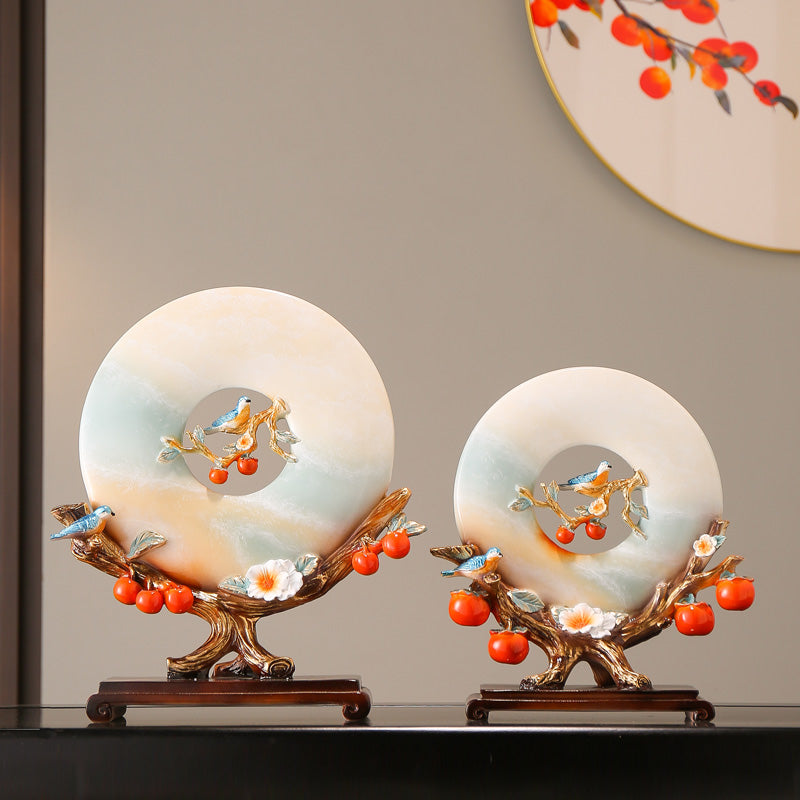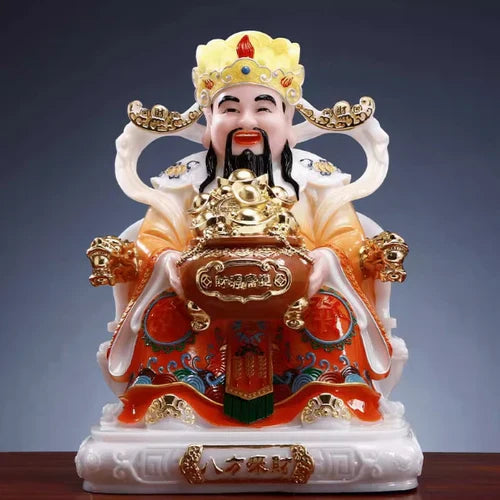In the pursuit of a better life, we often explore ways to enhance the quality and energy of our living environments. What you may not know is that the green plants placed in your home are more than just decorations adding vitality and beauty to the space—from a Feng Shui perspective, they also hold a mysterious power that influences your fortune. Today, let’s step into the world of Feng Shui and unlock the secrets of selecting suitable indoor plants, turning every leaf into a "lucky charm" for your life.
I. Choose Plants by the Five Elements: Balance the Energy Field
The Five Elements (Wu Xing) theory is one of the cornerstones of Feng Shui. Everything in the world can be categorized into the five elements—Metal, Wood, Water, Fire, and Earth—and green plants are no exception. Selecting plants based on the Five Elements can effectively harmonize the energy field (Qi) in your home and promote smooth fortune.
-
For those lacking Wood: Opt for Wood-element plants such as Lucky Bamboo, Asparagus Fern, or Pothos. These plants have slender leaves and upright stems, brimming with vitality—like new shoots breaking through the soil, they embody vigorous growth energy. Place them in the east of your home (the east corresponds to Wood in the Five Elements); this mutual resonance strengthens Wood energy, which helps boost career fortune, allowing your career to thrive like these plants.
-
For those lacking Water: Water-element plants like Chinese Money Plant, Monstera Deliciosa, or Evergreen are excellent choices. The round leaves of the Chinese Money Plant resemble ancient copper coins, symbolizing continuous wealth like flowing water; the unique, well-veined leaves of Monstera Deliciosa seem to hold the agility and wisdom of water. Place them in the north (the north corresponds to Water), which enhances Water energy—beneficial for interpersonal relationships and intellectual growth, making your thinking sharper and interactions smoother.
-
For those lacking Fire: Fire-element plants such as Anthurium, 鸿运当头 (Hong Yun Dang Tou, or "Good Luck on Top"), or Poinsettia can provide support. The vivid red flowers of Anthurium are like burning flames, full of passion and vitality; Hong Yun Dang Tou has green leaves with bright red flowers blooming on top, symbolizing good luck approaching. The south corresponds to Fire—placing these plants there activates Fire energy, enhancing your personal aura and fortune, and making you more proactive and decisive in your career.
-
For those lacking Metal: Metal-element plants like Succulents, Golden-edged Spider Plant, or Peace Lily are suitable. Succulents have thick, plump leaves with a texture as tough as metal; the golden edges on the leaves of Golden-edged Spider Plant shimmer like metal. The west corresponds to Metal—placing them here strengthens Metal energy, which is conducive to wealth accumulation and stable career development, boosting your wealth luck and the luck of meeting noble helpers (people who offer support).
-
For those lacking Earth: Choose Earth-element plants such as Clivia, Money Tree, or Rubber Plant. Clivia has broad leaves and elegant flowers; the round leaves of the Money Tree look like strung coins. Place them in the center of your home (the center corresponds to Earth), which stabilizes the home’s energy field, bringing stability and abundance to the family and solidifying the foundation of your life.
II. Select Plants by Space: Ensure Harmony in Every Area
Different spaces in your home have distinct functions and energy fields. Choosing plants that match these spaces can make the energy more harmonious and your life more comfortable.
-
Living Room: As the core area for family activities and receiving guests, it is suitable for placing tall plants with broad leaves, such as Money Tree, Happiness Tree, or Monstera Deliciosa. The Money Tree symbolizes abundant wealth, and its lush foliage represents the accumulation of fortune; the Happiness Tree has an elegant shape, exuding vitality and symbolizing family happiness. Place these plants in the home’s "wealth position" (usually the diagonal corner of the living room)—they can gather wealth and boost fortune, infusing the family with positive energy and enhancing overall luck.
-
Bedroom: A private space for rest and relaxation, it requires a quiet and warm atmosphere. Therefore, avoid placing large, spiky, or strongly scented plants. Small, gentle plants are more appropriate, such as Aloe Vera, Cactus (releases oxygen at night, aiding sleep), or Lavender (its faint fragrance calms emotions and promotes sleep). Place them on the bedroom windowsill or nightstand—they purify the air while adding tranquility to the sleeping environment, helping you recharge better during rest.
-
Study: A space for learning, working, and thinking, it needs to enhance focus and wisdom. Suitable plants include Asparagus Fern, Lucky Bamboo, and 山竹花 (Shan Zhu Hua, or "Mountain Bamboo Flower"). Asparagus Fern has an elegant appearance, adding a literary touch to the study; Lucky Bamboo symbolizes progress in studies and career; Shan Zhu Hua helps strengthen Wen Chang Yun (academic/creative luck) and improve thinking abilities. Place them on the desk or bookshelf—they make your thinking sharper and inspiration flow endlessly during work or study.
-
Kitchen: An area prone to oil fumes and heat, it is suitable for plants that are resistant to oil fumes and can purify the air, such as Mint, Spider Plant, or Pothos. Mint not only freshens the air but also its unique scent refreshes the mind, keeping you in a good mood while cooking; Spider Plant and Pothos have strong air-purifying abilities, effectively absorbing harmful substances in oil fumes and creating a relatively fresh environment in the kitchen. Hang them on the kitchen wall or place them by the windowsill—they take up little space while exerting their purifying effect.
-
Bathroom: Often dark, damp, and prone to bacteria and odors, it is ideal for shade-tolerant, moisture-resistant plants that can purify the air, such as Snake Plant, Maidenhair Fern, or English Ivy. The thick leaves of Snake Plant absorb moisture and odors; the delicate leaves of Maidenhair Fern add natural beauty to the bathroom; English Ivy absorbs air pollutants and improves air quality. Place them in the bathroom corner or hang them on the wall—even this relatively enclosed space can be filled with vitality.
III. Avoid Taboos to Maintain Vitality: Let Plants Boost Your Life
When choosing indoor plants, pay attention to certain Feng Shui taboos to avoid adverse effects.
-
Spiky plants: Such as Cactus, Prickly Pear, or Rose—though they can ward off negative energy (Sha Qi) in specific situations, they are not suitable for main living areas like the living room or bedroom. In Feng Shui, the sharp shape of spiky plants is believed to trigger verbal conflicts and harm the harmonious relationship among family members. If you need to use spiky plants to ward off Sha Qi, place them on the balcony or windows facing the source of negative energy (e.g., sharp corners of neighboring buildings), but be careful to prevent family members from getting pricked.
-
Wilted or yellowing plants: Clean and replace them promptly. Such plants symbolize the loss of vitality—they cannot bring positive energy to the home; instead, they may generate negative energy and affect family fortune. Regularly check the growth of your plants: if you find withered or diseased ones, wrap them in red cloth and dispose of them properly (e.g., take them to a garbage station or a natural outdoor area), then replace them with healthy plants to keep your home filled with vitality.
-
Plants with overly strange shapes: Avoid these. Feng Shui emphasizes balance and harmony—plants with extremely odd shapes may disrupt the energy balance of the space and cause discomfort. Choose plants with regular, elegant shapes, which are more conducive to creating a comfortable and harmonious living environment.
-
Artificial plants: Though they require no maintenance and retain their shape for a long time, from a Feng Shui perspective, they lack natural vitality and cannot regulate the energy field or absorb Qi like real plants. Therefore, prioritize live plants to decorate your home, allowing the vitality of nature to flow through your living space.



